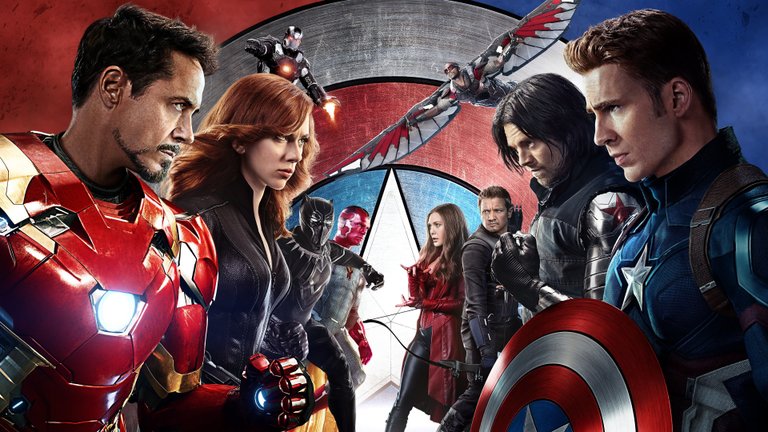
2016 was one of the best years in history for Marvel Comics, at least regarding its film activities. The main reason is that Marvel with Marvel Cinematic Universe utterly dominated its main competitor, DC Comics and its film project, the DC Extended Universe, at the box office . Nowhere was this more evident than in the fact that DC's flagship film, Batman v Superman: Dawn of Justice, earned less than Marvel's Captain America: Civil War. This achievement is even more significant for Marvel, considering that this was not one of their top-tier films—like The Avengers—but merely a "regular" sequel in the saga of a single superhero, which fans of other Marvel heroes could theoretically ignore.
However, the film directed by brothers Anthony and Joe Russo is much more ambitious and spectacular than it might appear at first glance, leading many observers to label it a sort of mini-version of The Avengers. The reasons for this are in Marvel's effort to counter DC's pairing of its more established heroes, Batman and Superman. Thus, Captain America had to share his film with a powerful ensemble of his superhero colleagues instead of having a solo adventure. This created a certain problem since the villain that the Avengers must confront needs to be on par with the Chitauri in the first film or Ultron in the second but still below the level of supervillain Thanos, who was reserved for the "real" sequels in the Avengers saga. An elegant solution emerged from one of Marvel's relatively newer comic book series titled Civil War, which, as the name suggests, forced the Avengers into an uncomfortable situation where they must fight against one another.
The plot of the film relies on Avengers: Age of Ultron, depicting the political consequences of the spectacular clash in Sokovia, which turned public opinion against superheroes due to mass destruction and human casualties. In response, world governments, led by the United States, devised a plan to regulate superhero activities through international agreements via the UN. While Tony Stark, alias Iron Man (played by Robert Downey Jr.), believes this is a very good idea, Steve Rogers, alias Captain America (played by Chris Evans), has a completely different opinion and is convinced that it will lead to bureaucratic delays and numerous abuses. Their disagreements escalate further after a diplomatic conference in Vienna during which an African king from Wakanda is killed in a bombing attack, prompting his son and heir T’Challa (played by Chadwick Boseman)—who turns out to have superhuman powers—to seek out and kill the perpetrator. The problem for Rogers is that the culprit is none other than his old war buddy “Bucky” Barnes (played by Sebastian Stan), who has had his mind wiped. Rogers is determined to protect “Bucky” from both T’Challa and Stark, who intends to hand him over to authorities, leading to a spectacular and brutal confrontation among former colleagues and best friends.
Civl War shares the same issue as Dawn of Justice. Viewers understand that superhero characters must be preserved for future sequels and their franchises; therefore, despite the intensity of their conflict, they will ultimately have to bury the hatchet by the end. Similarly to DC's film, Marvel has "cleverly" exploited this mass gathering of superheroes not only to attract as broad a fan base as possible but also to serve as groundwork—a sort of prelude—for individual films dedicated to characters from this fictional universe, in this case featuring Black Panther and rebooted Spider-Man (played by an enthusiastic Tom Holland). The Russo brothers have done a solid job compared to Zack Snyder primarily because they did not insist on a dark atmosphere and gloomy cinematography; instead, they aimed to maintain some balance between light-hearted superhero adventure and grim drama until the final part of the film. They were aided by a series of quite good action scenes.
The main drawback of Civil War, like many Marvel films, lies in its weak script. Partly due to an abundance of characters—many serving merely as decoration—and partly due to less-than-ideal characterisation. The biggest mistake is that Steven Rogers' character—a member of a generation that prioritised state over individual—insists on some rights for superheroes to dispense justice on a "do-it-yourself" basis while individualistic industrialist Tony Stark suddenly becomes an advocate for bureaucratic regulation. This, along with an overly melodramatic finale, detracts significantly from this film; however, fans of Marvel's universe and even most casual viewers are unlikely to have major complaints.
RATING: 5/10 (++)
Blog in Croatian https://draxblog.com
Blog in English https://draxreview.wordpress.com/
InLeo blog https://inleo.io/@drax.leo
Hiveonboard: https://hiveonboard.com?ref=drax
InLeo: https://inleo.io/signup?referral=drax.leo
Rising Star game: https://www.risingstargame.com?referrer=drax
1Inch: https://1inch.exchange/#/r/0x83823d8CCB74F828148258BB4457642124b1328e
BTC donations: 1EWxiMiP6iiG9rger3NuUSd6HByaxQWafG
ETH donations: 0xB305F144323b99e6f8b1d66f5D7DE78B498C32A7
BCH donations: qpvxw0jax79lhmvlgcldkzpqanf03r9cjv8y6gtmk9